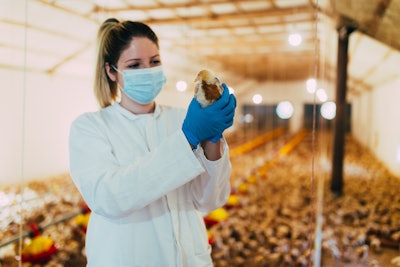
Infectious coryza, caused by Avibacterium paragalinarum, is a highly contagious respiratory disease that can be diagnosed via bacterial culture. Vaccination is effective against the disease, however a short supply limits its use.
Chickens are the only natural host for infectious coryza. Symptoms include facial swelling, nasal discharge and sinusitis and it typically results in a sharp drop in feed consumption and egg production.
There is currently an outbreak of infectious coryza in the Midwest.
“Most of North America used to be pretty free of infectious coryza until it started creeping up in the south and then started going into those cooler areas. It used to be a warn weather disease,” Dr. Yuko Sato, associate professor, Iowa State University, explained during her session “Greetings from the Lab: Emerging and Re-emerging Layer Diseases” at the Virtual Georgia Layer Conference.
Diagnosis and prevention
Diagnosis of infectious coryza is typically performed in the lab, either by bacterial culture, serotyping or PCR testing.
“If you’ve cut it open in the field, you can kind of… guess based on the clinical signs that you probably have coryza,” said Sato. “What you probably need is a confirmation” by performing a necropsy and bacterial culture of the heads of hens with suspected infectious coryza..
Vaccines are sometimes used to prevent infectious coryza, but it’s important to verify that vaccine is intended to treat the specific bacterial strain behind coryza. Serotyping can isolate the bacterial strain to confirm if a vaccine will be effective.
Another challenge of vaccinating layers against infectious coryza is shortages. This is a two-step vaccine process and it is difficult to stock the amount of therapeutics necessary. This has prompted a move toward autogenous vaccines from killed vaccines.
In some cases, antibiotics are used, however there are currently no antibiotics designed to specifically target infectious coryza.

















